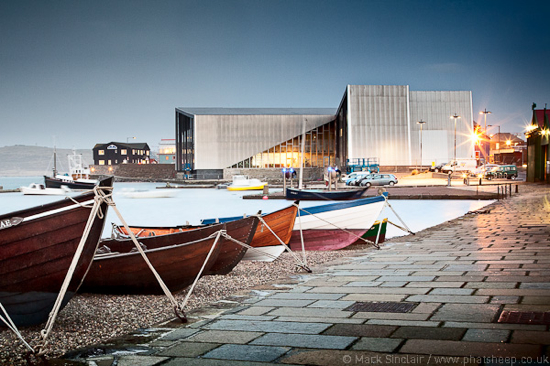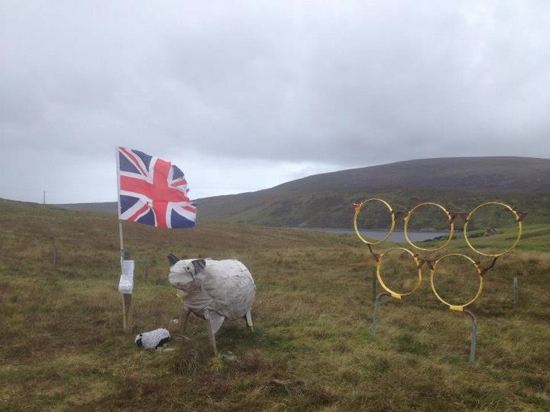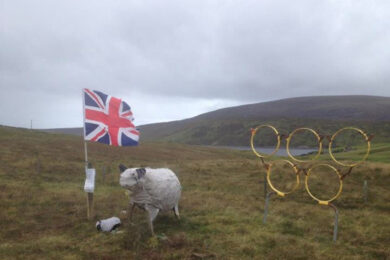There’s a shot in Keepie Uppie, a mock documentary by James Stokes entered into Shetland Arts’ Hansel of Film project, where the camera moves from the interviewee and settles on goldfish in a bowl behind her. It’s an inexplicable flourish and I search for moments like this – the strange and unexpected details that linger in the mind – in the many short films I watch at Screenplay festival.
Lately my centre of gravity has shifted north. From London, where people board cheap flights to Spain and the Eurostar to France, I’ve moved home to the Orkney Islands, and consider travelling to Norway, Iceland, the Faroes – and of course Shetland. Although I grew up in Orkney, I have never been to the Shetland Islands before so Screenplay is the ideal excuse to finally make the trip. It’s a seven-hour journey on the ferry from Orkney to Lerwick – Shetland is considerably further north, at 60 degrees latitude, and Lerwick is closer to Bergen in Norway than it is to Aberdeen – and I find a hillier, increasingly moorland landscape. The long, thin main island is carved with dramatic inlets of water (‘voes’) and beautiful bays, and around each corner are huge views out to smaller islands with Norse-sounding names: Yell, Unst, Papa Stour. It’s like the Scottish Highlands mixed with Norway, but in island form.
A sold out hit at the festival is a timely piece of investigative journalism, You’ve Been Trumped, about American tycoon Donald Trump’s plans to build a massive golf complex on the Aberdeenshire coast – on an an environmentally important sand dune system – including a 450-room hotel and 1500 luxury homes. The original planning proposal was turned down by Aberdeen Council but this decision was overruled by the Scottish Government. Anthony Baxter’s film documents the lives of the residents around the site. We see the bulldozers starting work, disputes over land boundaries, earth piled up outside of neighbouring houses in what resembles intimidation, and rough treatment by security guards and the police of the filmmaker himself. With his brash style and unashamed greed, Trump is a pantomime villain from the off, but the documentary shows that his company’s actions provide more reason to dislike him than his silly hair. The shocking disregard for planning regulations and environmental worries run parallel to the tycoon being pandered to by the Scottish National Party and Aberdeen’s Robert Gordon University, who hand him an honorary degree. This is stirring and unbelievable stuff.
You’ve Been Trumped is sprinkled with clips from Local Hero, the 1983 Scottish classic about the fight to stop an oil refinery being built on an unspoilt bay. Bill Forsyth’s feature is also screened in its entirety at Screenplay to a warm reception, as is a new print of the director’s 1980 debut That Sinking Feeling, about a quartet of dispossessed Glasgow teenagers who come up with a novel moneymaking scheme.
It’s hard to get my head around Orkney being to the south when I watch The Imaginary Worlds of Scapa Flow, a docudrama by Mark Jenkins inspired by the memoirs of service men and women stationed there during both world wars. It’s intriguing and atmospheric, with shots of beaches and the sea intercut with unusually dressed characters and narration in both Orcadian and English accents. Although maybe lacking enough structure for the 35 minutes running time, everything comes together at the end with the photos of service people dressing up that inspired the costumes and tableaux depicted. It gives the viewer an insight into how busy the islands would have been at that time, when up to 60,000 people were sent to Orkney (quadrupling the population), the mad things they did to entertain themselves, and the way the landscape affected and stayed with them after they left.
The Imaginary Worlds of Scapa Flow – trailer from Mark Jenkins on Vimeo.
After watching Lars Von Trier’s Melancholia, I walk beside the harbour and confuse the sound of the Shetland wind and seas for the rumble of an approaching meteor. It’s a wild and strange kind of place that invites imaginative thinking. On the day after the festival I drive to the far north of the island, on wide roads past large houses (Shetland has done well out of North Sea oil). Where the road finally ends, I find a llama farm. Nearby, a mysterious passenger aircraft is on the hillside beside a house. The local newspaper carries the mind bending headline ‘Foula To Replace Fetlar As Fictional Fustra’, the latest developments on a big budget movie that is going to be made in the islands soon. Is my perception of the place influenced by things I have seen on screen? Or are these panoramas inherently cinematic?
Each day at Screenplay includes an hour-long screening of shorts (ranging from 17 seconds to five minutes) from the Hansel of Film project. This is part of the nebulous Cultural Olympiad, which involved Shetland Arts gathering productions from around the country and showing them in unusual venues, from Shetland to Southampton and back. The films are of variable quality, but watching twenty of these is more worthwhile than watching Keith Lemon. Often a simple idea, brilliantly executed, is the best: gymnasts in slow motion, a zombie flick utilising sock puppets. However, some of the glossier, more professional efforts feel advert-like and make the audience switch off. In contrast, the ramshackle ones are refreshing.
This is the 6th Screenplay festival co-curated by critic Mark Kermode and his film historian wife Linda Ruth Williams, in conjunction with Shetland Arts. It runs alongside book festival Wordplay and this is the first year that it has been held in purpose-built cinema and arts venue Mareel. For a population of just 22,400 there is a lot going on in Shetland, as revealed in a showcase of shorts made in the islands. Topics include about a young immigrant arriving in Shetland from North Africa, the strange Halloween tradition of ‘skekling’, a dialect film assembled by kids and a joyous cake fight. Some lads mucking around with cardboard boxes on their heads is very basic, but somehow it is just great to see unembarrassed creativity in the cinema rather than simply consuming the mass produced.
Mareel, courtesy of Phatsheep Photography

Tom Lloyd’s short documentary Hefted describes the concept of a flock of sheep being ‘hefted’ to a certain area of land so they do not wander away, despite the lack of fences. Lloyd extends the idea to explore how people are hefted to the landscape by emotional and cultural ties, particularly in rural areas. Although this is set in the Lake District, it obviously strikes a chord at Shetland, which is so remote from the rest of the UK. Although many young people move away from here they often return, just as others are attracted to the isles. However, the doc neglects to mention the negative side of being hefted – a feeling of duty overriding the opportunity to escape, or the wariness of newcomers who may not have a link to a family hefted for generations.
If there are any unifying factors in Screenplay programme it is that the selections are often from the perspective of marginalised groups, struggling against authority to maintain their identity. Many come to the realisation that it’s these idiosyncrasies that make places and people special. The same can be said for the festival itself; it’s not about premiers or celebrities (in fact, the actor q&a sessions with the likes of Miranda Richardson seem incongruous). The event obviously cannot complete with Cannes for weather or glamour – nor would it want to – so capitalises on the fact that Shetland is fairly hard to get to and has an unpredictable climate in September. Coming here is a special adventure and during gales or showers it’s good to have the option of being in a cinema, although if you do visit be sure to go out into the wilds.



